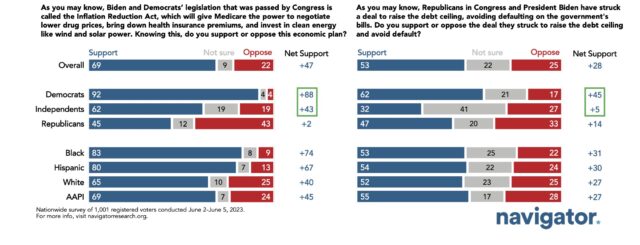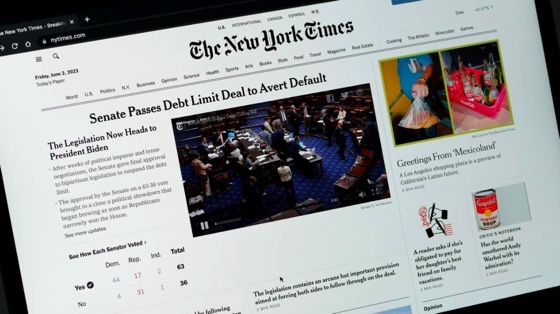- Three in five Americans are hearing “a lot” or “some” about the debt ceiling deal struck between Republicans in Congress and President Biden in keeping with the share aware of the June 1st deadline last month, and a majority support the deal.
- The most strongly supported outcomes of the deal and the strongest messaging lanes for President Biden include protecting Social Security, Medicare, Medicaid, and veterans’ benefits.
- Against a conservative argument, the strongest progressive rebuttal on the debt ceiling deal incorporates protecting programs while reducing the deficit by ending tax breaks for the wealthy and big corporations.
Less Than a Third of Americans Have Heard “a Lot” About the Debt Ceiling, While a Majority Support the Deal
Two in five independents (41%), along with one in five Democrats (21%) and Republicans (20%), report that they are “not sure” whether they support or oppose the deal to raise the debt ceiling.
- Americans who report hearing “a lot” or “some” about the deal support it by a 44-point margin.
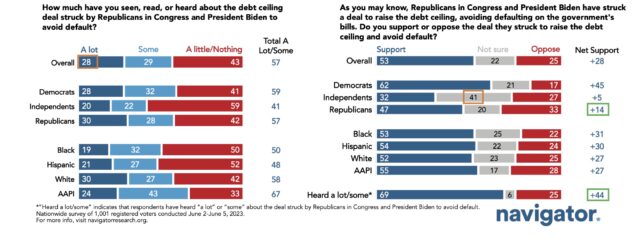
Roughly Three in Five Are Hearing About the Debt Ceiling Deal; Same Share Heard About June Deadline Weeks Ago
Fewer Americans have now heard about the debt ceiling deal struck by Republicans in Congress and President Biden and had heard about a potential default in early May (57% hearing “a lot” or “some” each) than heard about the shooting down of a Chinese surveillance balloon in February (78%), Trump’s potential indictment in March (66%), or the collapse of Silicon Valley Bank in March (59%).
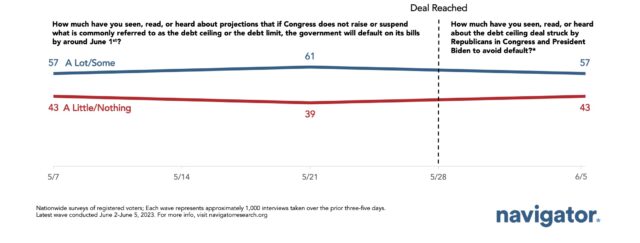
Kevin McCarthy’s Favorability Remains Stagnant and Underwater Post-Debt Ceiling Deal
McCarthy is underwater by 15 points overall, in keeping with his mid-March numbers: pluralities of independents rate him negatively (net -26 favorable), and 24% of Republicans view him unfavorably.
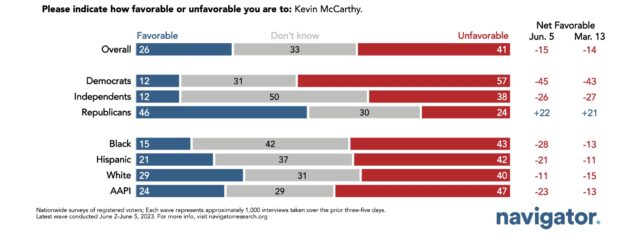
Biden and Democrats More Trusted on Protecting Social Security, Medicare, and Medicaid, and Working Across the Aisle
Americans trust Biden and the Democratic Party more than the Republican Party on “protecting Social Security, Medicare, and Medicaid” (net +10) and “working across the aisle” (net +7).
- Americans who make under $50,000 a year trust Democrats more than Republicans on “protecting Social Security, Medicare, and Medicaid” (net +13 Democrats) and “protecting the economic interests of American families” (net +8 Democrats).
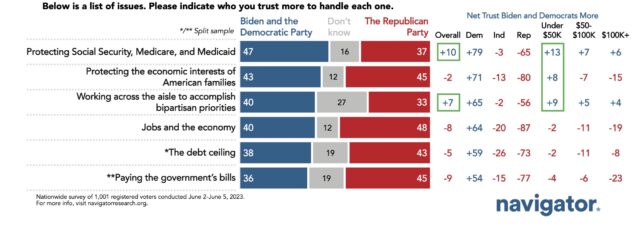
Most Think Government Spends Too Little on Veterans, Affording the Basics, Tax Cuts for Working Americans, SS/Medicare
More than two in three say the U.S. government spends too little on benefits for veterans (70% too little) and helping people afford the basics (68%). By contrast, most say the government spends too much on tax cuts for large corporations (net +32 too much).
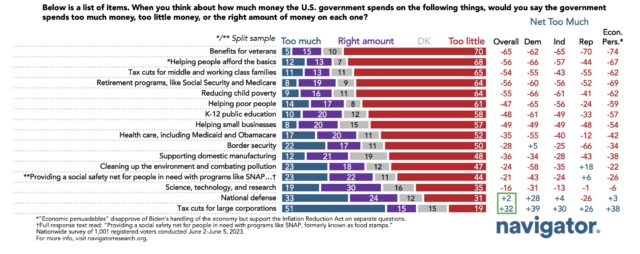
The Debt Deal’s Funding of Veterans’ Care, SS/Medicare, Health Care, Education, and Medicaid Strongest Selling Points
Independents most strongly support that the deal “fully funds medical care for veterans” (77% support), “makes sure the government can pay its bills to avoid default and ensures payments like Social Security and Medicare aren’t delayed or canceled” (75%), and “expands SNAP… for veterans, homeless people, and young people aging out of foster care” (71%).
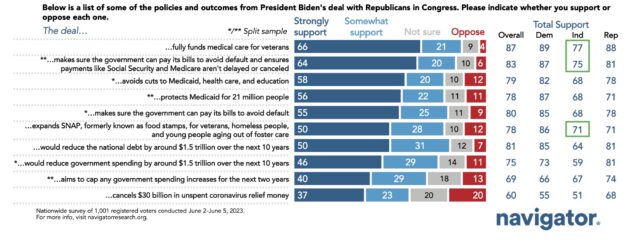
Bipartisan Pluralities Support the Debt Ceiling Deal When They Learn More About It
Information about the deal boosts support most among Republicans (net 36-point increase, from net +14 to net +50), independents (net 25-point increase, from net +5 to net +30), and white Americans (28-point increase, from net +27 to net +55).
- Midwestern Americans (29% are debt ceiling movers*), women (27%), 18–44-year-olds (27%), blue collar and service industry workers (26% each), and rural Americans (26%) are more likely to be debt ceiling movers; 22% of Americans are debt ceiling movers overall.
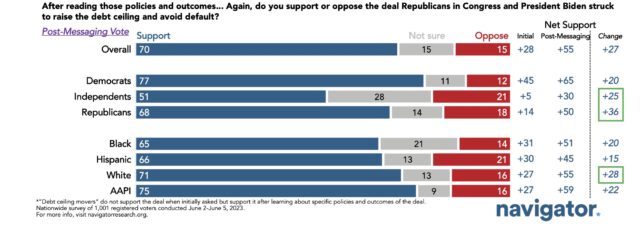
Most Convincing Statements on Biden’s Handling of Debt Ceiling: Protecting SS, Medicare, Medicaid, Veterans’ Benefits
The most convincing arguments overall and with debt ceiling movers* highlight President Biden protecting Social Security and Medicare (net +38 and net +28, respectively), protecting Medicaid (+35 and +22), and protecting veterans’ benefits (+32 and +22).
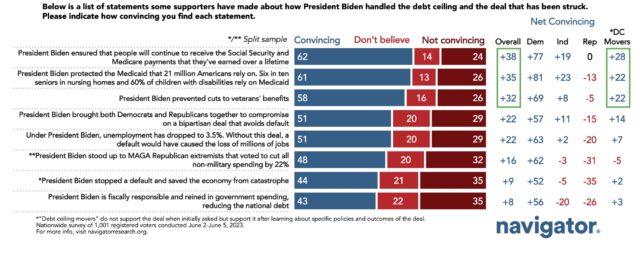
Emphasizing Democrats’ Protection of Social Security/Medicare and GOP Refusals to Tax the Rich is Strongest
A progressive argument emphasizing Congressional Republicans’ willingness to cut essential programs while extending tax breaks for the wealthy and big corporations is the most effective rebuttal to a conservative portrayal of blocking new government spending in the deal (net +6).
- A less effective argument focuses on Congressional Republicans trying to “manufacture an economic crisis that would have hurt millions of Americans, just to score political points against President Biden,” which loses to the conservative argument (net -6).
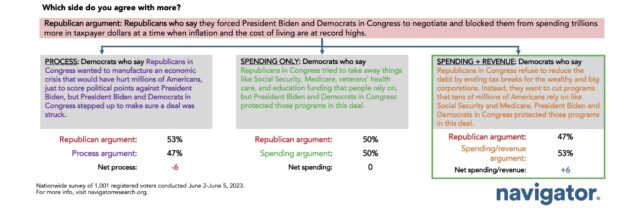
The Inflation Reduction Act Remains Broadly Supported – More Than the Recent Debt Deal, and In Spite of Republican Attacks
Democrats and independents are much more supportive of the Inflation Reduction Act (net +88 and net +43 support, respectively) than the debt ceiling deal (+45 and +5), as are members of every racial group. Only Republicans are more supportive of the debt ceiling deal (net +2 on Inflation Reduction Act, net +14 on debt ceiling deal).
